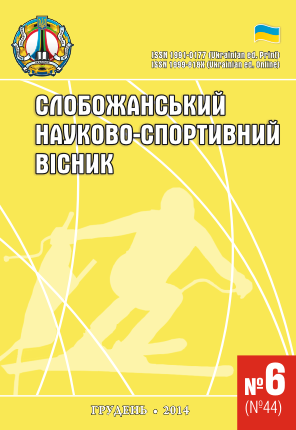The state of application of innovation approaches in physical education of regional education establishments
DOI:
https://doi.org/10.15391/snsv.2014-6.013Keywords:
physical education, modern innovation technologies, physical culture teachers, secondary educational establishmentsAbstract
Purpose: to determine relation and degree of readiness of physical culture teachers of regional educational establishments for application innovation approaches in educational process. Material and Methods: in research 29 teachers of physical culture took part from town of Izum and Izum district of Kharkov region. The following methods were used: theoretical analysis and generalization of scientific literature, questioning, mathematic statistics. Results: it is established the positive relation of the physical culture teachers of regional schools innovation educational approaches: determined that only, approximately 50 percent teachers use their in education process. It is revealed that majority teachers strive for riding their educational experience, but doing that they feel deficit of scientific methodical literature directed to enhancing the level of their professional skill. Conclusions: it is determined the positive relation of teachers of physical culture of regional secondary schools to inculcate innovation technologies in educational training process, but they turned out prepared insufficiently for innovation activity.
References
Glazirіn D. D. Osnovi diferentsіyovanogo fіzichnogo vikhovannya [Basics differentiated physical education], Cherkasi, 2003, 351 p. (ukr)
Grinova T. І., Mulik K. V. Slobozans’kij nauk.-sport. visn. [Slobozhanskyi science and sport bulletin], Kharkіv, 2014, vol. 1, pp. 22–27. (ukr)
Zheleznyak Yu. D. Teoriya i praktika fizicheskoy kultury [Theory and Practice of Physical Culture], 2006, vol. 4, pp. 9–12. (rus)
Krutsevich T. Yu. Upravleniye fizicheskim sostoyaniyem podrostkov v sisteme fizicheskogo vospitaniya : avtoref. d-ra nauk po FV i S [Managing physical condition of adolescents in the system of physical education : Doct. of science thesis], Kiyev, 2000, 44 p. (rus)
Krutsevich T. Yu. Metodichnі rekomendatsіі z kompleksnogo testuvannya fіzichnogo stanu shkolyarіv v umovakh fіzichnogo vikhovannya zagalnoosvіtnіy shkolі [Guidelines for Comprehensive testing physical condition of students in terms of physical education secondary school], Kiіv, 2006, 24 p. (ukr)
Krutsevich T. Yu., Balagіy O. L., Smolіus G. G., Andreyeva O. V. Metodichnі rekomendatsіі shchodo pіdvishchennya yefektivnostі rіznikh program fіzichnogo vikhovannya v shkolі, іkh zmіstu ta tekhnologіі realіzatsіі [Guidelines for improving the effectiveness of various programs of physical education at school, their content and technology implementation], Kyiv, 2006, 25 p. (ukr)
Moskalenko N. V. Moloda sportivna nauka Ukraіni [Young sports science Ukraine], Lvіv, 2006, pp. 299–301. (ukr)
Moskalenko N. V., Lomako N. M. Іntegrovanі uroki v sistemі fіzichnogo vikhovannya dіtey molodshogo shkіlnogo vіku [Integrated lessons in the system of physical education of children of primary school age], 2007, 33 p. (ukr)
Moskalenko N. V. Sportivniy vіsnik Pridnіprov’ya [Sports Bulletin Dnieper], 2009, vol. 1, p. 19–22. (ukr)
Moskalenko N. V., Vlasyuk O. O., Stepanova V. V., Shiyan O. V. Іnnovatsіynі tekhnologіі u fіzichnomu vikhovannі shkolyarіv [Innovative technology in physical education students], Dnіpropetrovsk, 2011, 238 p. (ukr)
Muskharіna Yu. Yu., Babak V. V., Burov Yu. V., Chernobay S. O. Pedagogіka, psikhologіya ta mediko-bіologіchnі problemi fіzichnogo vikhovannya і sportu [Pedagogy, psychology and medical-biological problems of physical education and sport], 2013, vol. 12, pp. 47–52. (ukr)
Shmeleva Ye. A. Fizicheskaya kultura v shkole [Physical Culture in Schools], 2013, vol. 3, pp. 10–13. (rus)
Downloads
Published
How to Cite
Issue
Section
License
Copyright (c) 2014 (Irina Maslyak) Масляк Ірина Павлівна, (Margarita Mameshina) Мамешина Маргарита Анатоліївна, (Vjacheslav Zhuk) Жук В’ячеслав Олександрович

This work is licensed under a Creative Commons Attribution 4.0 International License.
Our publications make use of copyright CREATIVE COMMONS open access journals.
Authors published in this journal agree to the following terms:
1 The authors reserve the right of authorship of the work and pass the journal right of first publication of this work are licensed under the Creative Commons Attribution License, which allows others to freely distribute the published work with reference to the authors of the original work and the first publication of this magazine.
2 The authors have the right to enter into separate agreements for additional non-exclusive distribution of work in the form in which it was published the magazine (such as work place electronic repository institution or publish as part of the monograph), provided that the reference to the first publication of this magazine.

 Attention, authors!
Attention, authors!


